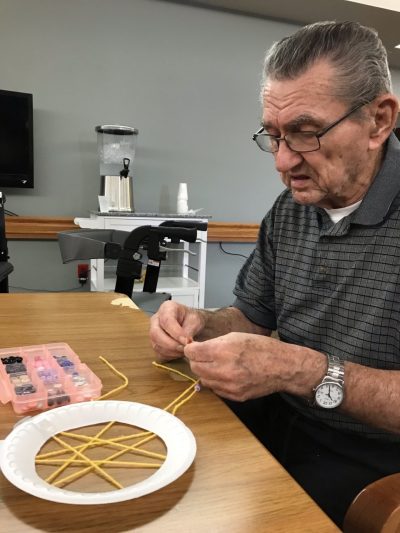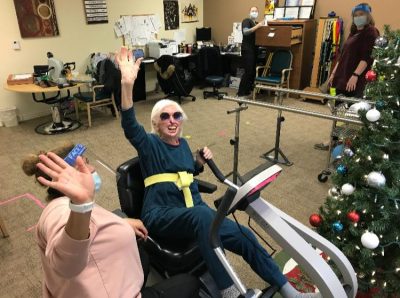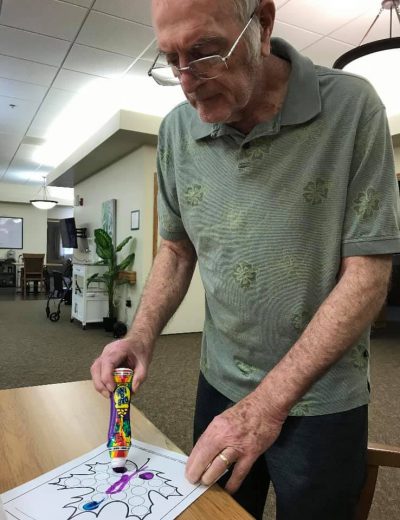As you may know, we have fully integrated Montessori-Based Dementia Programming into our care here at Arbor Springs. This means most of our activities and many other things we do with our community members are structured around the Montessori method. You’ve probably heard a lot about Montessori from us and have a basic understanding of its concept and principles…but what exactly is Montessori, and what does it have to do with Alzheimer’s and dementia care?
Who is Maria Montessori?
First of all, it is helpful to know a little bit about the Montessori method’s creator, Maria Montessori. An Italian physician and educator, Maria Montessori became interested in medicine at a young age, which led her to develop the Montessori method of education. She practiced and studied medicine as well as worked with children of varying cognitive abilities, many of whom were not accepted by the mainstream educational system at the time. It was in this work that the seed of her method was planted.
Over several years, she slowly developed and refined different strategies and techniques for reaching those who had difficulty with traditional schooling and education. As she honed her techniques, she was allowed to apply these practices to children operating within the educational mainstream as well. This culminated in the creation of the Montessori method – her legacy and most significant contribution to the world.
What is the Montessori Method?
 The Montessori method is a child-centric and student-led teaching style that employs various tactics and tools to allow children to engage with their environment, community, and own self in the learning process. The Montessori method aims to motivate and teach students through exploration, discovery, and experience instead of having information delivered to the student via an instructor.
The Montessori method is a child-centric and student-led teaching style that employs various tactics and tools to allow children to engage with their environment, community, and own self in the learning process. The Montessori method aims to motivate and teach students through exploration, discovery, and experience instead of having information delivered to the student via an instructor.
It focuses on creating an environment conducive to learning and empowering students to make their own decisions and guide their learning. There is a heavy emphasis on choice, self-reliance, and group work. Montessori schools often use specialized tools and materials, as well as specifically tailored environments, all designed to aid in the student’s learning. There is also an emphasis on taking each individual student’s own habits and learning style into account. By listening to the student and empowering them to seek out their personal knowledge and truth, the Montessori method aims for a more organic, unique, and therefore effective teaching style.
There are many schools and institutions that specialize in the Montessori method. And while they can establish and embrace elaborate systems and teaching styles, the core principles of student engagement and empowerment remain at the core. While the Montessori method has experienced pushback from more Western styles and pre-established educational systems, proponents of which believe in more formal and traditional teaching ideas, its theory of education has experienced great success when adapted to help seniors with memory loss.
How Does it Apply to Alzheimer’s And Dementia Care?
Many practices of the Montessori method can be applied to those struggling with Alzheimer’s and Dementia. Those suffering from memory loss and cognitive decline often respond very well to structured and simplified activities conducted in a specialized environment that promotes learning. The original principles of self-empowerment and activity-based education in the Montessori method can effectively engage seniors that may have a hard time functioning on their own or remembering how to do certain tasks.
While Montessori-Based Dementia Programming does use the principles and borrows heavily from Montessori’s teachings, there are some key differences. Montessori is the DNA, but it has been modified to work more suitably for those with memory challenges and at all stages of Alzheimer’s and dementia.
While the Montessori method places high importance on independence, seniors with memory issues often require more attention and guidance. Usually, they will not be left on their own or manage group activities. This is possible, but only in advanced and special cases. It is the techniques and mindset of Montessori that create a strong backbone for Montessori-Based Dementia Programming.

When applied to memory care, there is a much greater focus on the environment and learning through activity. Through this, many seniors have success reengaging because they can discover, act out, and sometimes relearn skills on their own.
Not only does this type of activity have a positive response for those with memory loss, but these principles create an environment and space that allow seniors to thrive.
By empowering individuals, improving environments, and focusing on simple tasks, Montessori’s principles can be applied with excellent results. It is vital to remember that those with Alzheimer’s and dementia are still able to learn. While they have difficulty with memory or particular functions, other elements of their thought processes can be both embraced and, in some circumstances, improved. Playing to these strengths and using Montessori techniques can help those with memory deficiencies reengage with daily activities and often become better at basic skills and tasks.
Montessori-Based Dementia Programming at Arbor Springs
Applying the Montessori method to Alzheimer’s and dementia care can be done in a variety of ways. Some ways that we’ve found work best here at Arbor Springs include:
- Gardening
- Cooking and baking
- Reading and writing letters
- Arts and crafts
- Folding and sorting laundry
- Washing dishes
- Labeling cupboards
- Developing personal daily routine schedules
It is also possible for you to do this at home or in most care environments with your loved one. These techniques and methods do not require fancy equipment or a lot of money. Simply creating a positive space, properly preparing the activity, and being deliberate in talking to and interacting with your loved one can have amazing results. You shouldn’t be intimidated or feel that you can’t apply these teachings and the Montessori method yourself. It just takes a little extra work and a bit of focus.
 You, Your Loved One, and The Montessori Method
You, Your Loved One, and The Montessori Method
It is important to remember that while there can be a lot of experience, thought, planning, and time that go into creating a Montessori Program or engaging seniors with the Montessori method, achieving results is actually fairly simple. By using some of Montessori’s primary tenants and rooting your activities in your loved one’s abilities and interests, it is possible to engage them with these straightforward techniques.
We are always happy to talk with you about the benefits of Montessori-Based Dementia Programming. Our specifically tailored program takes these principles and does a lot of that extra work that genuinely makes a difference. Whether you are exploring the Montessori method in your home or looking for that extra level of care to help a struggling loved one, we are here to help. Reach out today to learn more about how Montessori can make a difference in your life.



Leave A Comment